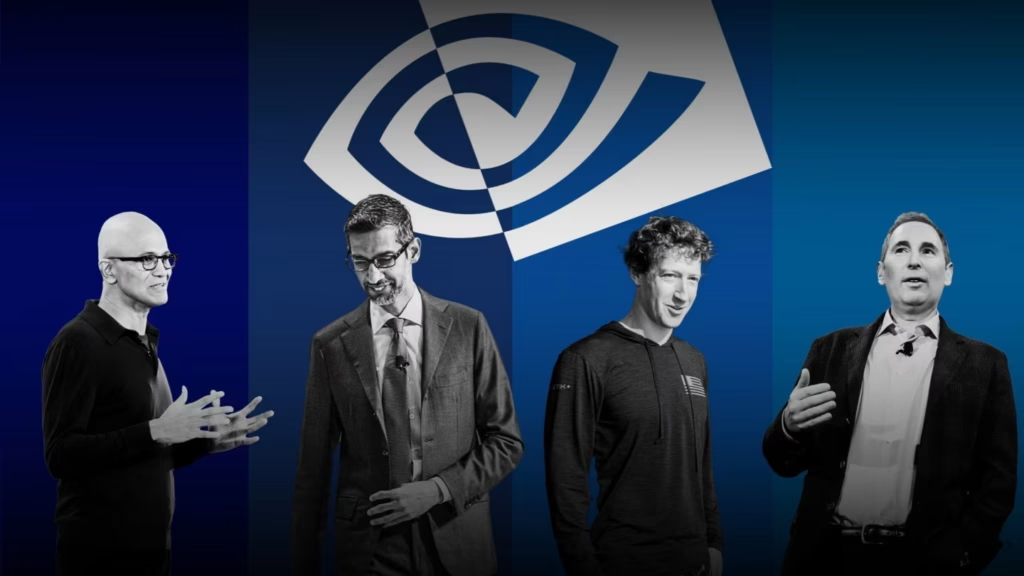In the second quarter of 2025, tech titans like Microsoft, Alphabet (Google), and Meta turned up the heat on artificial intelligence investments—massively expanding capital expenditures—to power everything from cloud infrastructure to ad targeting innovations. The eye‑popping costs have raised eyebrows, but Wall Street appears undeterred, cheering the early returns.
Table of Contents

AI: The Engine Behind Q2 Big Tech Spending Growth
In the April–June period, AI wasn’t just an R&D buzzword—it became a primary driver behind rising demand across key business lines: search, digital advertising, cloud services, and enterprise AI products. These shifts helped lift revenue at Microsoft, Meta and Alphabet to new heights.
Microsoft’s Azure AI offerings helped fuel revenue increases in cloud, while Google’s integration of generative AI into search boosted ad clicks and market share. Meta, meanwhile, leaned heavily on AI tools to sharpen ad targeting and keep user engagement strong across its platforms.

Big Bets, Even Bigger Budgets
The spending scale is staggering. Collectively, Microsoft, Alphabet, Meta—and Amazon—are expected to spend around US $320 billion or more on AI-related capital expenditures during 2025, up sharply from roughly $230 billion in 2024.
Alphabet alone increased its capex forecast from $75 billion to $85 billion, with roughly two‑thirds destined for chip procurement, data‑centre build‑out, and networking expansion. Microsoft is targeting $80 billion in capex and related AI expenses, while Meta’s AI budget now ranges between $64 billion and $72 billion in 2025.
In 2024 alone, the majors poured in over $246 billion on AI infrastructure, rising more than 44% year‑on‑year, with forecasts suggesting spending could hit $525 billion by the early 2030s.
Profits Under Pressure—But Staying Strong
Heavy spending inevitably comes with growing depreciation costs. In Q1 alone, these combined depreciation charges surpassed $15.6 billion, up from $11.4 billion a year earlier. With capex continuing to surge, analysts warn of an incoming “tsunami of depreciation” that could compress margins unless matched by revenue gains.
Some investors also voice concern that earnings could stagnate as free cash flow shrinks—calls for greater buybacks and dividends are rising weaker under layers of infrastructure and AI talent costs.
Yet, so far, sentiment remains upbeat. Microsoft posted revenue of $76.4 billion and earnings of $3.65 per share, posting 18% growth year‑on‑year, and confirmed that its fiscal 2026 capex could exceed $100 billion, as data‑centre demand intensifies.
Meta blew past expectations with Q2 revenue of $47.5 billion and earnings per share of $7.14, lifting its stock nearly 12% after hours and setting fresh all‑time highs near $780 per share.
Why Investors Still Back the AI Frenzy
1. Early Signs of Payback
Though capex is front‑loaded, the revenue momentum is undeniable. Meta’s AI‑powered ad tools delivered improved targeting and higher engagement; Google’s LLM presence in search pushed up ad impressions; and Microsoft’s AI services helped Azure grow faster than expected.
2. Strategic Positioning in a $7 Trillion Opportunity
Industry projections estimate that cumulative global AI‑related investment may approach $7 trillion by 2030, potentially adding trillions to GDP. Hyperscalers view this as a once‑in‑a‑generation opportunity to cement dominance in enterprise AI, cloud and emerging AI applications.
3. Fear of Missing Out
Executives publicly voice a shared anxiety: too little investment risks being left behind. As one investor noted, tech CEOs believe “they can’t afford to be wrong by doing too little.”. Broad AI adoption across business functions is already underway, and competition is fierce.
But Don’t Call It a No‑Risk Bet
Still, not everyone is comfortable. Critics warn of a “Field of Dreams” scenario—“if you build it, they will come”—that may overlook the complexity of monetising AI. Questions linger: will these investments deliver sustainable margins and long-term returns, or will they erode cash flows and force pricing realities later on?
Meta’s projected global AI spending is expected to rise to $114–$118 billion in 2025, and potentially surpass $105 billion in 2026 as server and datacenter growth escalates —a level some analysts argue will strain profitability if AI products don’t scale as rapidly as hoped.
Looking Ahead: Who Will Pay Off?
Key players now face pivotal challenges:
- Microsoft must sustain momentum in Azure and enterprise AI while balancing rising capex. Its partnership with OpenAI and Copilot-integrated features offers high growth—but execution will be crucial.
- Alphabet’s $85 billion capex increase positions it strongly in AI infrastructure, yet its success hinges on cloud adoption catching up and long-term search monetisation through AI gains.
- Meta bets heavily on AI-driven ads and new hardware frontiers (like AI eyewear), but must continue proving returns on platforms like Ray‑Ban smart glasses and its Superintelligence initiative.
Markets seem confident—Microsoft’s shares are on track toward a near‑$4 trillion to $5 trillion valuation, and Meta’s stock recently surged after earnings beats. Alphabet and NVIDIA stock also rallied on Google’s capex bump, signalling broader hardware/hardware‑supplier strength.

Conclusion: Big Tech’s AI Spending Splurge
Big Tech’s AI capital expenditures in 2025 represent some of the boldest corporate bets in modern history, led by Microsoft, Alphabet, Meta, and Amazon. While the outlays pressure cash flows and raise substantial depreciation costs, investors appear willing to ride the wave, confident that the blend of rising demand, platform growth and strategic long‑term positioning will soon justify the capital.
In short: yes, Big Tech may be breaking the bank for AI—but so far, investors seem to love it.
Join Our Social Media Channels:
WhatsApp: NaijaEyes
Facebook: NaijaEyes
Twitter: NaijaEyes
Instagram: NaijaEyes
TikTok: NaijaEyes








































